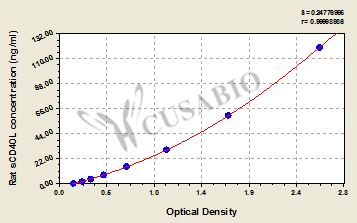The Rat Soluble Cluster of differentiation 40 ligand (sCD40L) ELISA Kit is a quantitative sandwich assay designed for the accurate detection and measurement of CD40 ligand protein in serum, plasma, and tissue homogenates from Rattus norvegicus (Rat) samples.
CD40 ligand (CD40L)is a proteinthat plays a crucial role in the immune system by providing signals for the activation of antigen-presenting cells, and its dysregulation has been linked to several immune disorders.CD40L protein plays an important role in immune response and is a prime target for inflammation. This ELISA kit provides a reliable tool for the quantitative measurement of sCD40L in Rat samples, with a detection range of 1.87 ng/mL-120 ng/mL and a sensitivity of 0.47 ng/mL.
The assay is easy to use, with a total assay time of 1-5 hours and a sample volume of 50-100ul. The detection wavelength is 450 nm, making it compatible with most ELISA plate readers.






